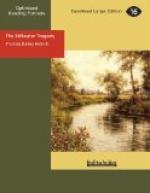“Perhaps he found it difficult to do so.”
“Why should he find it difficult?”
“Suppose he believed them.”
“But he could not believe them, whatever they are.”
“Well, then, suppose he was not at liberty to speak.”
“It seems that you are, Mr. Perkins, and you owe it to me to be explicit. What does Taggett suspect?”
Lawyer Perkins brooded a while before replying. His practice was of a miscellaneous sort, confined in the main to what is technically termed office practice. Though he was frequently engaged in small cases of assault and battery,—he could scarcely escape that in Stillwater,—he had never conducted an important criminal case; but when Lawyer Perkins looked up from his brief reverie, he had fully resolved to undertake the defense of Richard Shackford.
“I will tell you what Taggett suspects,” he said slowly, “if you will allow me to tell you in my own way. I must ask a number of questions.”
Richard gave a half-impatient nod of assent.
“Where were you on the night of the murder?” inquired Lawyer Perkins, after a slight pause.
“I spent the evening at the Slocums’, until ten o’clock; then I went home,—but not directly. It was moonlight, and I walked about, perhaps for an hour.”
“Did you meet any one?”
“Not that I recollect. I walked out of town, on the turnpike.”
“When you returned to your boarding-house, did you meet any one?”
“No, I let myself in with a pass-key. The family had retired, with the exception of Mr. Pinkham.”
“Then you saw him?”
“No, but I heard him; he was playing on the flute at his chamber window, or near it. He always plays on the flute when he can’t sleep.”
“What o’clock was that?”
“It must have been after eleven.”
“Your stroll was confined to the end of the town most remote from Welch’s Court?”
“Yes, I just cruised around on the outskirts.”
“I wish you had spoken with somebody that night.”
“The streets were deserted. I wasn’t likely to meet persons on the turnpike.”
“However, some one may have seen you without your knowing it?”
“Yes,” said Richard curtly. He was growing restive under these interrogations, the drift of which was plain enough to be disagreeable. Moreover, Mr. Perkins had insensibly assumed the tone and air of a counsel cross-examining a witness on the other side. This nocturnal cruise, whose direction and duration were known only to young Shackford, struck Lawyer Perkins unpleasantly. He meditated a moment before putting the next question.
“Were you on good terms—I mean fairly good terms—with your cousin?”
“No,” said Richard; “but the fault was not mine. He never liked me. As a child I annoyed him, I suppose, and when I grew up I offended him by running away to sea. My mortal offense, however, was accepting a situation in Slocum’s Yard. I have been in my cousin’s house only twice in three years.”




